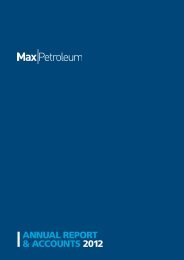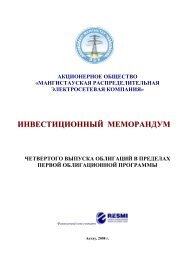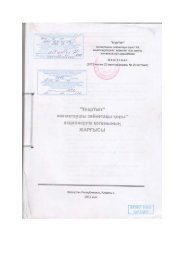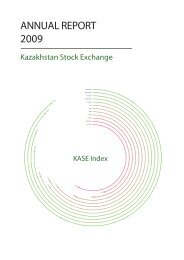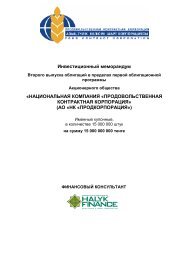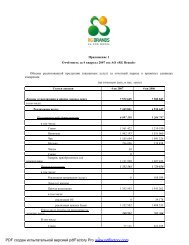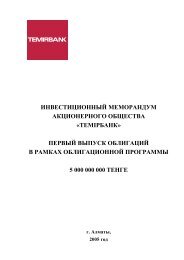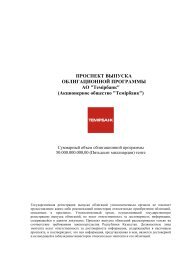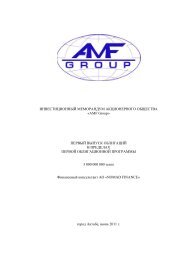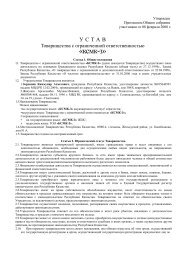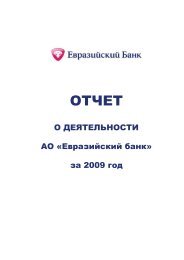JPMorgan - KASE
JPMorgan - KASE
JPMorgan - KASE
You also want an ePaper? Increase the reach of your titles
YUMPU automatically turns print PDFs into web optimized ePapers that Google loves.
not expected to, have any operations. The issuer’s ability to meet its financial obligations under<br />
the notes will depend on payments under the intercompany loan. These payments and our ability<br />
to satisfy our obligations under the guarantees will depend on our future operating<br />
performance, which is subject to prevailing economic conditions, industry cycles and financial,<br />
business and other factors, many of which are beyond our control. There can be no assurance<br />
that our business will continue to generate cash flows at or above current levels. If we are unable<br />
to generate sufficient cash flows from operations to service the intercompany loan, we may be<br />
required, among other things, to seek additional financing in the debt market, to refinance or<br />
restructure all or a portion of our indebtedness, to sell selected assets or to reduce or delay<br />
planned capital expenditures or acquisitions. There can be no assurance that any of these<br />
measures will enable us to service our indebtedness under the intercompany loan or meet our<br />
obligations under the guarantees, or that any such financing, refinancing or sale of assets would<br />
be available on economically favorable terms. See “Management’s Discussion and Analysis of<br />
Financial Condition and Results of Operations — Liquidity and Capital Resources”.<br />
Your right to receive payments under the guarantees, and the issuer’s right to receive payments<br />
under the intercompany loan, will be effectively subordinated to our existing and future secured<br />
indebtedness and all of the existing and future indebtedness of our non-guarantor subsidiaries.<br />
Our ability to make restricted payments and other investments under the indenture could<br />
materially increase this risk.<br />
The guarantees will be general unsecured, unsubordinated obligations of the guarantors and the<br />
intercompany loan will be a general unsecured, unsubordinated obligation of HKM, in each case,<br />
ranking pari passu in right of payment with all senior indebtedness of the guarantors, including<br />
borrowings under our Term Facility. In the event of bankruptcy, liquidation or reorganization<br />
relating to us, the assets of the guarantors will be available to pay obligations on the guarantees<br />
and the intercompany loan, as applicable, and such other senior indebtedness of the guarantors;<br />
however, the guarantees and the intercompany loan will be effectively subordinated to secured<br />
indebtedness of the guarantors to the extent of the assets securing any such indebtedness. In the<br />
event of a bankruptcy, liquidation or reorganization, any assets of the guarantors which may<br />
remain after payment to our secured creditors may not be sufficient to pay the amounts due on<br />
the guarantees or the intercompany loan, as applicable. As of September 30, 2002, on a pro<br />
forma basis giving effect to the borrowings under our Term Facility, the repayment of our<br />
predecessor term facility and the redemption of our Senior Notes (see “Use of Proceeds”), the<br />
guarantors would have had approximately $384.4 million of secured indebtedness outstanding<br />
and our non-guarantor subsidiaries would have had no indebtedness outstanding. The indenture<br />
will permit the guarantors from time to time to incur substantial additional secured<br />
indebtedness, subject to certain restrictions.<br />
In addition, the guarantees and the intercompany loan will be effectively subordinated to all<br />
indebtedness of our non-guarantor subsidiaries. The indenture will permit our non-guarantor<br />
subsidiaries from time to time to incur additional indebtedness, subject to certain restrictions.<br />
Further, the terms of the indenture permit us to, among other things, repurchase our capital<br />
stock, pay dividends in respect thereof or make investments of a material amount without<br />
substantial restrictions. As a result of these payments, our shareholders may be able to be paid in<br />
respect of their interests while notes are still outstanding notwithstanding the restricted<br />
payments covenant pertaining to the notes. See “Description of the Notes — Certain Covenants”.<br />
The issuer may not be able to repurchase your notes.<br />
Upon the occurrence of specific change of control events affecting us, you will have the right to<br />
require the issuer to offer to repurchase your notes at 101% of their principal amount, plus<br />
accrued and unpaid interest and any other amounts due, if any. The issuer’s ability to repurchase<br />
your notes upon such a change of control event may be limited by the terms of our other debt<br />
agreements and our access to funds at the time of the repurchase. Upon a change of control<br />
event, we may be required immediately to repay the outstanding principal, any accrued interest<br />
26



